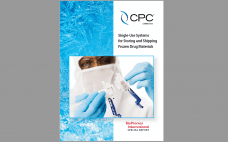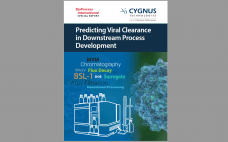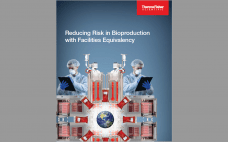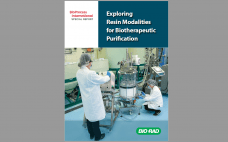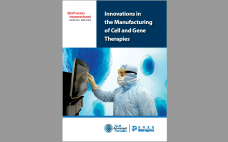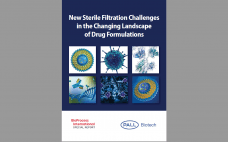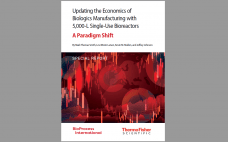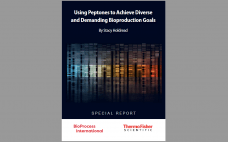Using presterilized, single-use freeze–thaw systems instead of traditional freeze–thaw platforms that include stainless-steel tanks and bottles can help biomanufacturers manage the quality of their drug substances. Single-use assemblies reduce the risk of cross-contamination, simplify dispensing, and decrease the number of manual interventions during freezing, thawing, handling, and shipping. However, implementing a freeze–thaw process requires careful testing of the physical and thermal properties of single-use systems and related aseptic connectors as well as assessment of drug-substance quality and stability. Such evaluation…
Special Reports
Predicting Viral Clearance in Downstream Process Development
As viruses can arise during the manufacture of biopharmaceuticals, regulatory agencies require viral clearance validation studies for each biopharmaceutical prior to approval. These studies are typically conducted in biosafety level (BSL)-2 facilities and require large capital and human resources. The use of an accurate, economical, and quantifiable noninfectious viral surrogate would enable downstream purification scientists to study viral clearance throughout process development. This report explores the use of a BSL-1 compatible, noninfectious MVM particles to predict viral clearance results over…
How Capacitance Measurement Can Improve Viral Vector and Virus-Based Vaccine Production
With the increasing development of viral vector and virus-based vaccines, technologies that help to manufacture and scale up these types of vaccine quickly and cost-effectively have become more critical. By accessing this special report from Aditya Bhat, a capacitance technology expert at Aber Instruments, you will find out how in-line capacitance measurement can produce a detailed fingerprint of cell culture processes and how that can benefit vaccine production. From case studies involving baculovirus, AAV, and measles, you will discover why…
Reducing Risk in Bioproduction with Facilities Equivalency
Providing consistency in cell culture media biomanufacturing is critical to supply continuity. Central to this is the development of redundancy and harmonization across a global manufacturing network. These unprecedented times have also highlighted the importance of strategizing for increased and unexpected demand. Read this Special Report to learn about the importance of equivalency and the strategies used to maintain this critical requirement at Gibco cell culture media manufacturing facilities. Fill out the form below to read the complete report and…
Case Study for a Facility-Fit Driven Process Development
Time to clinic and time to market are the key drivers for client success in the biopharmaceutical industry. Facility fit is becoming key to understanding process constraints and which aspects of the process have the largest impact on enabling facility fit. Process development with facility-fit constraints in mind will ensure a smooth technology transfer and shorten the timeline of current good manufacturing practice (CGMP) product delivery to clients. Fill out the form below to read this Special Report and learn…
Exploring Resin Modalities for Biotherapeutic Purification
New chromatography supports must demonstrate improved selectivity, and bead technologies must be optimized for high binding capacity and product recovery. Drug manufacturers also need access to expertise and continued support from chromatography suppliers that can assist with method development and design of experiments (DoE) assessments. Working together, these industry groups can accelerate method development, increase process yield, reduce buffer consumption, minimize the number of unit operations, and improve overall process economies. Learn more in this Special Report about how resin…
Innovations in the Manufacturing of Cell and Gene Therapies
Advancements in next-generation cell and gene therapies are fulfilling the promise of personalized medicine and attempting to cure and heal patients. Multiple approved products have been launched in global markets and the number of clinical trials continues to grow. Developing innovative advanced therapies is one of the biopharmaceutical industry’s greatest opportunities to dramatically improve patients’ lives. WuXi Advanced Therapies is a contract testing, development, and manufacturing organization (CTDMO) that has launched several innovative world-class platforms. It offers integrated platforms to…
Drug Formulations Are Changing:
New Sterile Filtration Challenges in the Changing Landscape of Drug Formulations
Read about the challenges of sterile filtration of high concentration mAbs, liposomes, and lentiviral vectors, and how to solve them in this Special Report. Development of new, complex drug formulations has given us therapeutics with properties that are markedly different from traditional drug types. High viscosity or low surface tension formulations or large viral vector molecules can mean that sterile filtration processes, which are optimized for traditional drug types, are not as efficient for the new, complex formulations. Premature filter…
Updating the Economics of Biologics Manufacturing with 5,000-L Single-Use Bioreactors: A Paradigm Shift
Single-use technologies enable a flexibility and modularity effectively unattainable with more traditional stainless-steel technologies, particularly in upstream bioprocesses. Single-use bioreactors up to 2,000 L are employed largely in preclinical- and clinical-stage bioprocesses to leverage this flexibility. As products reach commercial maturity, scales larger than 2,000 L frequently become desirable to take advantage of economies of scale. With the typical upper limit of single-use bioreactors at 2,000 L, this has traditionally meant transfer to stainless-steel systems. The introduction of the Thermo…
Using Peptones to Achieve Diverse and Demanding Bioproduction Goals
As bioproduction requirements advance, it is critical to have consistent, high-quality media and supplements that continue to meet evolving industry needs. Peptones have been successfully used in bioproduction applications for more than 30 years to meet diverse and demanding production requirements. Their unique nutritional profiles and usage flexibility make peptones ideal components for creating a robust bioprocess. This Special Report will demonstrate the benefits of peptones and how they can be used to enhance process performance and consistently yield a…

